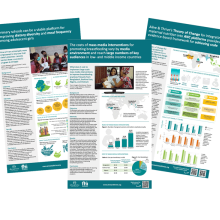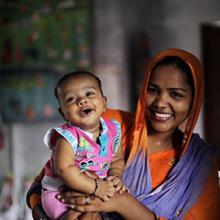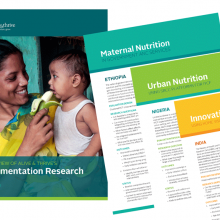Journal article
Oct 30 2023

Law matters – assessment of country-level code implementation and sales of breastmilk substitutes in South Asia (Ching C, Sethi V, et al. Frontiers in Public Health. 2023)
This study examines the status of implementation of the International Code of Marketing of Breast-milk Substitutes of eight countries in the South Asia region (Afghanistan, Bangladesh, Bhutan, India, Maldives, Nepal, Pakistan, and Sri Lanka), and describes the sales value and volume of commercial
Presentation
Jan 12 2023

Adolescent nutrition, maternal nutrition theory of change and media costs posters presented at the SBCC Summit
Three posters on mass media costing, scaling up maternal nutrition, and school-based nutrition highlight results from some of Alive & Thrive's implementation research in Africa and Asia. They were shared at the 2022 SBCC Summit in Marrakech, Morocco, in December.
Journal article
Jan 10 2023

The Financial Costs of Mass Media Interventions Used for Improving Breastfeeding Practices in Bangladesh, Burkina Faso, Nigeria, and Vietnam (Sanghvi T.G., et al, 2022)
This analysis documents the financial costs and budgetary needs for implementing mass media components of large-scale breastfeeding programs, providing annual costs, cost structures, and coverage achieved through mass media interventions in four low- and middle-income countries.
Announcement
May 31 2022

South Asia Newsletter
Subscribe to and read our monthly South Asia Newsletter to stay up to date on all of Alive & Thrive's activities across the South Asia region.
Brief, Handout
Oct 28 2020

An overview of Alive & Thrive's implementation research
Alive & Thrive's implementation research spans its program areas, seeking to answer "how" to implement effective interventions and policies. Active studies are detailed in the attached documents.
Journal article
May 01 2018

Dietary diversity predicts the adequacy of micronutrient intake in pregnant adolescent girls and women in Bangladesh, but use of the 5-group cutoff poorly identifies individuals with inadequate intake (Nguyen PH., 2018. Journal of Nutrition)
The Minimum Dietary Diversity for Women (MDD-W) indicator based on a 10-food group women dietary diversity score (WDDS-10) has been validated to assess dietary quality in nonpregnant women.

